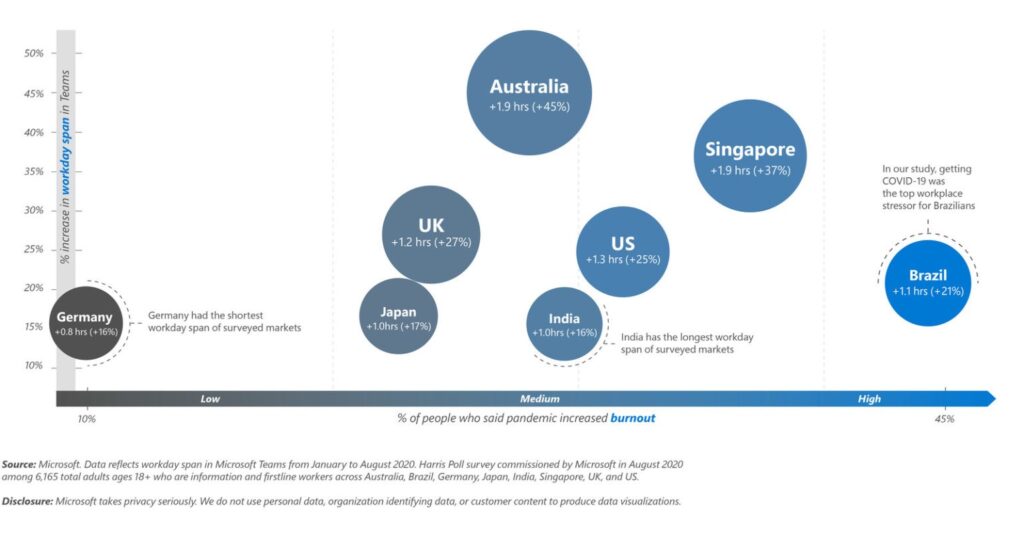The software giant took worker pulse readings via its Teams platform, and prescribed its own software improvements to boost worker well-being.
The lack of separation between work and personal life in remote-working arrangements, coupled with the constant worry of contracting COVID-19, seems to be taking a toll on workers in Singapore and around the region, according to Microsoft’s latest Work Trend Index report.
Surveying over 6,000 information- and frontline workers across eight countries globally, the study found that Singapore was the top country (37%) in Asia with workers facing increased burnout, compared to the average of 29% in India, Japan and Australia.
In addition, 33% percent of workers in Singapore cited worries about contracting COVID-19—due to the lack of tech or protective equipment provided by businesses to enforce social distancing—as a contributor to their increased stress levels.

Said Joanna Lim, Modern Work and Security Business Group Lead, Microsoft Singapore: “In the last six months, we have seen how COVID-19 has contributed to the evolution of the workplace from a physical space to one residing in a virtual world. As businesses adapt to a new way of working, it is important to examine the multifaceted impact these changes are having on employees and provide relevant and timely solutions.”
The firm’s study unveiled some other trends:
- The pandemic increased burnout risk in some countries more than others
Burnout can be attributed to many factors, and the chart below explores how longer workdays impact feelings of burnout. For example, workers in Australia saw the highest increase in workday span in Microsoft Teams at 45%, with a medium increase in burnout. This was also significantly different from workers in Germany that saw very little change to workday span or feelings of burnout. - Causes of workplace stress are different for frontline and remote-workers
The top stressors shared by workers in Singapore were the lack of separation between work and life (31%), and feeling isolated or disconnected from co-workers (28%). Also, 33% of workers claimed they had not been provided the tech or protective equipment they needed for sufficient social distancing, contributing to increased stress levels.
In Australia, the lack of separation between work and life was the top stressor (24%), with the feeling of isolation coming closely behind (22%). In India and Japan the inability to socially distance (42%) and the worry about contracting COVID-19 while on the job (26%) were top stressors.
- Six months into the pandemic, workers are bogged down with after-hours chats
Usage patterns of Teams showed that globally, even six months past the first work-from-home orders, people are engaging in significantly-more meetings, ad hoc calls and work chats than they did before the pandemic. As people adjusted to remote-working, so have after-hours chats, or chats between 5pm and midnight. - Non-commuting may be hurting, not helping, remote-worker productivity
It appears that commuting to and from work helps workers to maintain work-life boundaries, productivity and well-being. This ritual prepares people for work and detaches their minds afterwards. One study found that 6 in 10 people (61%) globally felt they were more productive when they can ramp up to and down from work through certain habits such as commuting. On average, productivity increased between 12% and 15%. - Studies show meditation can fight burnout and stress during the workday
Of those surveyed in Singapore, 74% said meditation could help decrease their work-related stress. External research backs this up: consistent meditation can decrease stress and burnout and improve workers’ ability to react to negative feedback.
Inspired by this research and conversations with customers, Microsoft announced the start of a longer journey to evolve its productivity tools to promote individual well-being and organizational resilience.
A series of updates have been launched within Microsoft Teams to support employee well-being. These include:
- a virtual-commute experience that helps users prepare for the day and mindfully-disconnect in the evening. Users can expect to customize their experiences from a set of suggested tasks such as meditation, reflecting on the day or putting closure to unsettling matters.
- new insights that supports managers and leaders in understanding how work happens, and its impact on employee well-being.
- a curated set of mindfulness and meditation experiences.
A new experiences for frontline workers program has been launched to support these heroic personnel with the tools they need to work more safely.
